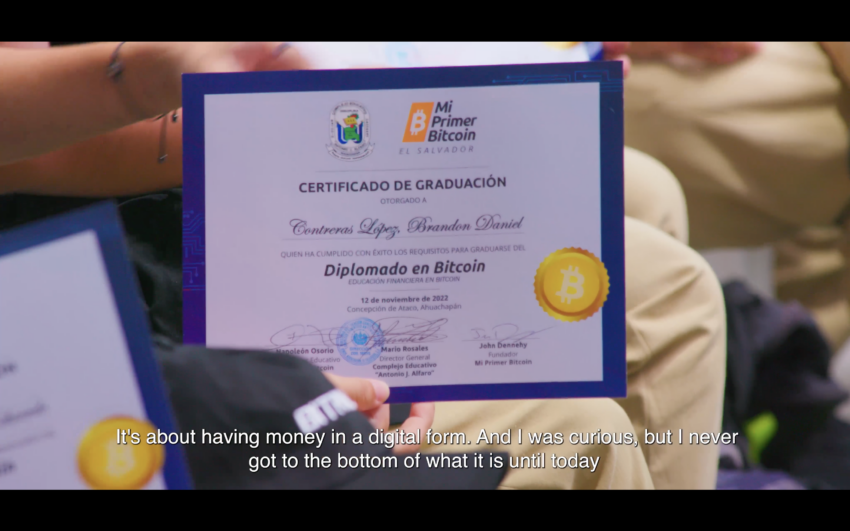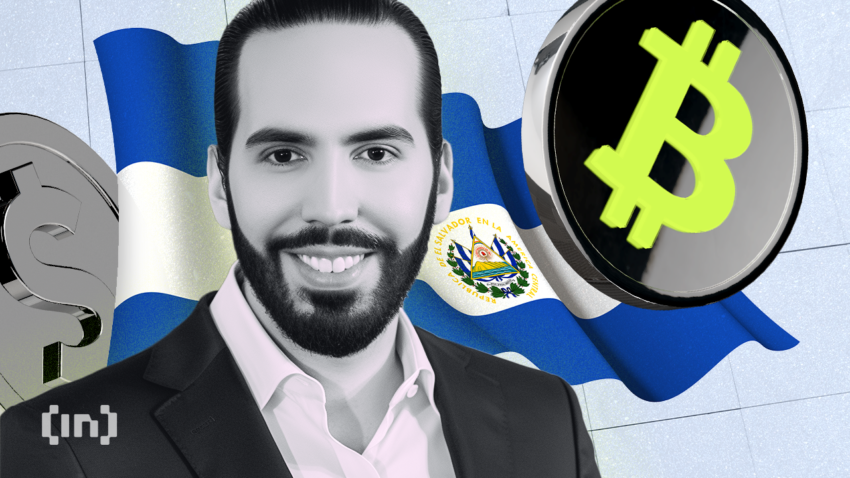It has been over two years since the Central American country El Salvador adopted Bitcoin (BTC) as legal tender. While it was a long-term plan for the country, the citizens already believe it has given them new hope.
The ethos of the Bitcoin ecosystem is don’t trust… verify. And that was the inspiration for the Bitfinex team to travel to El Salvador to make the documentary Don’t Trust… Verify, so that viewers can witness how Bitcoin has been adopted in the country from a first-person point of view.
The documentary is set to premiere on Oct. 22 in Lugano, Switzerland. However, BeInCrypto got an advance screening.
How El Salvador Youth Had Minimum Hopes for a Better Future
Until 2021, El Salvador was infamous for its high crime rates and the pervasive presence of gangs, painting a bleak picture of the nation’s security landscape. Then, the country started making headlines for its bold move, adopting Bitcoin as legal tender.
According to Mike Peterson, the director of Bitcoin Beach, young people have grown up in the country, living away from their parents.
This was because some parents shifted to the US for job opportunities, while others were imprisoned for gang involvement. Hence, Peterson spoke in the documentary that youth grew up thinking there was no hope in the country.
Bitcoin Beach is an initiative in El Zonte, a beach town in El Salvador. It got recognition because entrepreneurs and tourists in the area have increasingly used Bitcoin to conduct transactions, while workers in the town receive their salaries in digital currency.
Read more: A Definitive Guide to Non-Tech Jobs in Web3
Bitcoin: A New Hope For El Salvador
Amid the citizens’ involvement in criminal activities, El Salvador faced a stark lack of financial education. According to Statista, in 2021, only 36% of the country’s adult population had a bank account.
Roman Martinez, the co-founder of the community initiative “Hope House,” elaborated on how El Salvadorians had very limited access to financial services:
“My parents, my grandfather, they never had access to a bank account. They never save money. We never hear from anyone in our family about what money is or (what is) an asset, or transacting digitally or making and receiving digital payments. Those were things that people in the first world do; they just swash their credit cards, and they do it.”
Martinez believes Bitcoin pushes citizens to get financial education and empowers the unbanked. He said:
“I think when the President made Bitcoin a legal tender, he gave all of us a place to be excited for the future, a place to come and build, a place to come and dream.
“I think, as a human, we want to live in a place where we are excited for the future. Want to live in a place where we wake up, and we see hope. We want to live in the place where we see that things are moving to a better future.”
Martinez’s Hope House educates the youth so that they can find hope for a better future. It works on four pillars:
- Education
- Recreation
- Spirituality and
- Empowerment
Furthermore, Martinez also talked about the functioning of the Hope House. He explained that:
“We have a leader here every day. There are computers, we have internet, the kids can come here. We have different projects all day.
“Hope House is trying to empower the young people to stop dreaming about leaving the country but staying there and working there.”
How Bitcoin Helped Transform International Image of El Salvador
While Martinez and the Hope House make efforts to encourage the kids not to leave the country, the diaspora of Salvadoran citizens from around the world are returning to their home country. The podcaster Stephan Livera said:
“There’s been an increase in terms of Salvadorans who are coming back to the country, the diaspora from around the world, they’re coming back here to either invest or live here or work here.”
According to Livera, Bitcoin enthusiasts have also shown interest in moving to El Salvador. He said:
“They’re here because they want to see what it’s really like to spend lightning, receive lightning, what is it like actually living here, on the ground.”
Moreover, Alejandro Zelaya, the Finance Minister of El Salvador, confirmed that there has been at least a 30% increase in tourism after adopting Bitcoin as a legal tender. Zelaya believes that Bitcoin also helped revive the country’s international image. He said:
“Moreover, our past international image of being a violent country has been replaced. Thanks to Bitcoin, we’re globally recognized as an innovative nation that champions economic freedom and supports a globalized economy.
“Therefore, we’ve ripped the rewards not just in tourism but also through an improved international standard by pioneering a market many countries have yet to explore.”
The world started to return to normal in 2022 after the COVID-19 lockdowns. And this has also contributed to increased tourism in El Salvador.
Full-fledged Bitcoin Adoption Will Likely Take Time
While the Bitcoin Lightning network enables nearly instantaneous payments, the asset’s volatility might hinder full-fledged Bitcoin adoption. However, Mike Peterson says nearly 100 merchants accept Bitcoin payments in El Zonte, the Bitcoin Beach town.
BeInCrypto reported in September 2021 that over two million El Salvador citizens had started using the government-backed Chivo wallet after the government offered an incentive of $30 to citizens who downloaded it. Hence, this might have acted as a catalyst in increasing the number of users.
However, there is little recent data to show how many users are still actively using the Chivo wallet.
Regarding Bitcoin adoption, the podcaster Livera said:
“One of those things where you can’t expect it all to happen tomorrow, right? It’s a slow process, and especially given Bitcoin’s volatility, it’s going to necessarily be a slow process.”
Paolo Ardoino, the CTO of Bitfinex and Tether, who was recently promoted to CEO of Tether, cited the example of euro adoption in European countries.
He explained that it took nearly six years for the euro adoption throughout the continent despite making it compulsory. However, Bitcoin adoption in El Salvador is optional. Hence, he said:
“While we allow time to other countries to make this type of adoption. We have to allow the same time to do the work to make the Bitcoin adoption (in El Salvador).”
Moreover, there is a need to propagate Bitcoin education among citizens, especially among the youth. Mi Primer Bitcoin, a Bitcoin education project in El Salvador claimed that it educated 10,000 students in 2022. The students are educated on receiving Bitcoin through the lightning network, nodes, double-spending, and Bitcoin halving.
Read more: Bitcoin Halving Cycles and Investment Strategies: What To Know

Unrealized Loss of Millions
According to Nayibtracker, a website that tracks the Bitcoin portfolio of El Salvador, the country has an unrealized loss of $33.7 million. The website shows that it holds 3,054 Bitcoin at an average cost of $40,623.
In November 2022, Nayib Bukele, the President of El Salvador, announced that the country would buy one Bitcoin per day.
Felix Ulloa, the Vice President of El Salvador, believes that the unrealized loss should not be classified as a loss for the country. He said:
“We didn’t lose anything because we haven’t sold a single Bitcoin that we bought.”
Do you have anything to say about El Salvador or anything else? Write to us or join the discussion on our Telegram channel. You can also catch us on TikTok, Facebook, or X (Twitter).
For BeInCrypto’s latest Bitcoin (BTC) analysis, click here.
Disclaimer
Following the Trust Project guidelines, this feature article presents opinions and perspectives from industry experts or individuals. BeInCrypto is dedicated to transparent reporting, but the views expressed in this article do not necessarily reflect those of BeInCrypto or its staff. Readers should verify information independently and consult with a professional before making decisions based on this content. Please note that our Terms and Conditions, Privacy Policy, and Disclaimers have been updated.


